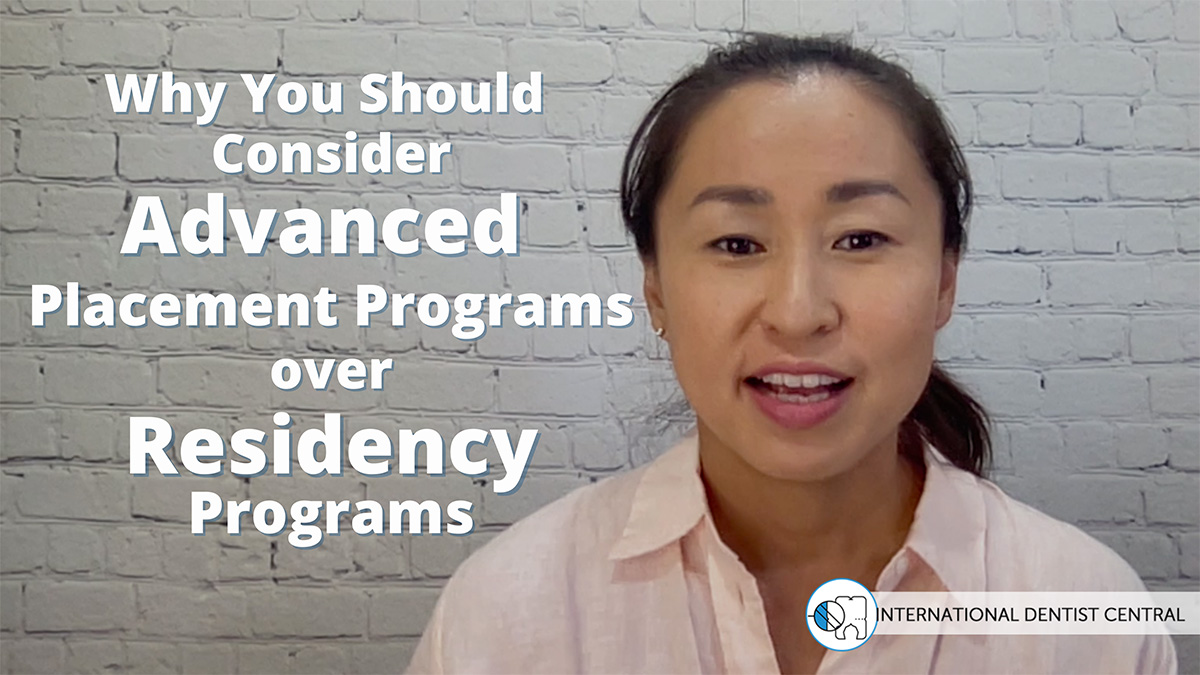Are you curious as to how dental schools accept international students? Dental schools accepting international students in two main types of programs. The programs which an international dentist can take are the DDS program and residency program. As someone interested in pursuing a career in dentistry, you may have asked yourself: what’s the difference between an Advanced Placement Program and a Residency Program? You might also wonder whether there’s a difference between the two programs in terms of earning potential, salary, and other career opportunities.
Advanced Placement Program vs. Residency Program
The idea of doing a residency program is appealing to many internationally trained dentists wanting to relocate to the U.S. The tuition is much much cheaper, and you are a specialist at the end of it!
On the other hand, Advanced Placement Programs will set you back $150k easily, and at the end of it, you’re a general dentist with a lot of student loans.
The pros of going through a residency program are pretty self-explanatory. Plus, you already did dental school, who wants to repeat that? Why not specialize now, right?
Why Advanced Placement Program is better than Residency Program
There are three main reasons why Advanced Placement Program is better than Residency Program:
#1 By default, international dentists are at a disadvantage when applying to residency programs
#2 the number of programs that accept dentists that studied at a non-ADA accredited dental school, AKA internationally trained dentists, are very limited, and
#3 you can only practice in a few states after your residency program is over. And the states can change their licensure criteria at any time.

Let’s look at each of these reasons in more depth.
- International dentists are at a disadvantage when applying to residency programs
Why is this?
The primary applicant pool for dental residency programs is 4th-year dental students that are studying in an ADA accredited dental school. This includes internationally trained dentists in their senior year of advanced placement program.
Generally speaking, this puts internationally trained dentists applying directly to residency programs at a disadvantage. Residency programs don’t have a reference point for the quality of education you received, because you’re not from an accredited dental school.
Dental schools in the US have to regularly go through the accreditation process and can lose the status of their education quality is not up to par. It’s quality control if you will. So residency programs more or less know what to expect from US dental school graduates, whether they’re from the traditional student pool or they’re international dentists that went through the advanced standing program.
Similarly, if a traditional dental student’s dental school lost the accreditation status before she/he graduates, she would also be at a disadvantage if she wanted to go to a residency program.
2. The number of programs that accept dentists that studied at a non-ADA accredited dental school, AKA internationally trained dentists, are very limited
They’re just not that many seats to go around. Each program has its own criteria for accepting residents, and if you’re going to apply, you’ll have to carve out a lot of time for research. Most programs list their first criteria as having graduated from the US or Canadian accredited dental school. Side note, US and Canada acknowledge each other’s accreditation status, so if you’re from a Canadian accredited school you can apply for a US residency program and vice versa.
A second criterion that puts some internationally trained dentists at an even further disadvantage is the residency/citizenship requirement. It’s not uncommon for programs to require all applicants to be a permanent resident or a citizen to apply
Anyway, the number of seats available to specialize is, unfortunately, just not that many.
#3 You can only practice in a few states at the completion of your program.
In the US, each state has its own rules regarding how you can get a license. It’s up to the state dental board to update the requirements, and they do from time to time. For the most up-to-date information, please refer to the state dental board’s website of the state you’re interested in practicing.
The worst-case scenario is the state you had your mindset on, changing their licensing criteria while you’re in your residency program.
Related Articles:
- List Of Dental Schools With International Dentist Program
- My Journey To Acceptance Into An Advanced Placement Program
- States That Accept Dental Licensure By Residency
Final Words
Those are some of the pros and cons of residency programs. Every year, there are international dentists that get accepted at them.
I’m not saying don’t apply. I work with residency applicants every year, I help them get in too. I see a lot, so I’m just trying to share information with you so that you can make the best decision for yourself. Because I think knowledge is power.




Leave A Comment